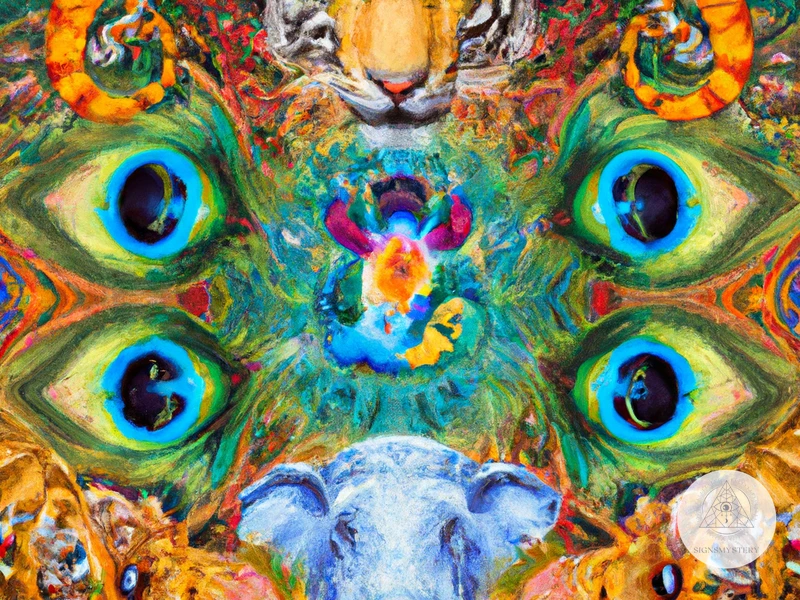The rich tapestry of Hinduism is woven with countless traditions, beliefs, and customs. One such fascinating aspect is the cultural significance of spirit animals in Hindu mythology and daily life. These spiritual beings, revered for their symbolism and lessons they impart, have ancient roots that trace back to the earliest days of Hinduism. By exploring the concept of spirit animals, their prominence in Hindu mythology, and their relevance in contemporary practice, we can gain a deeper understanding of the profound role they play in shaping the spiritual journey of individuals.
Overview of Hinduism
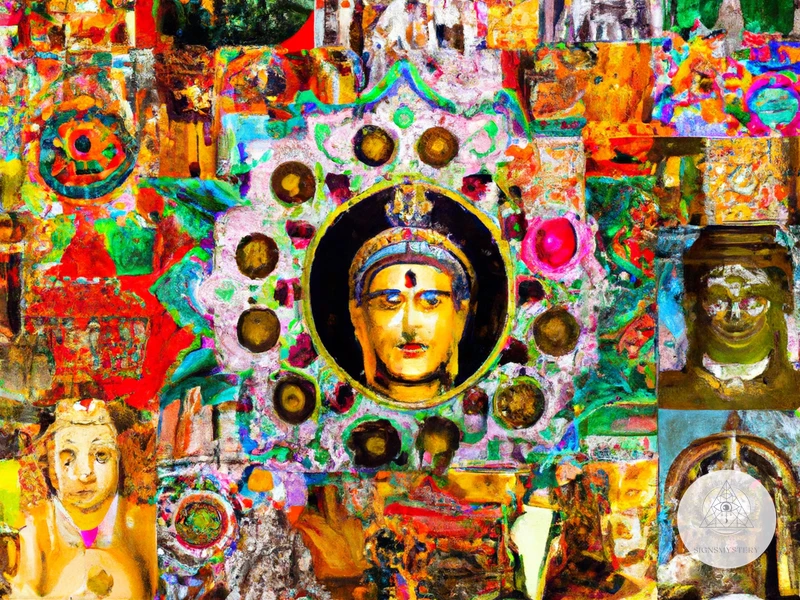
Overview of Hinduism

Hinduism is one of the oldest religions in the world, with a history that spans over 4,000 years. It is a complex and diverse religion with no single founder or central authority. Instead, it encompasses a wide range of beliefs, practices, and traditions that vary across different regions and communities. Hinduism is rooted in the ancient texts known as the Vedas, which contain hymns, rituals, and philosophical teachings. The religion is characterized by its belief in karma and reincarnation, the pursuit of spiritual enlightenment (moksha), and the worship of various gods and goddesses.
In Hinduism, spirituality is deeply ingrained in everyday life, and rituals play a significant role in religious practice. Hindu temples are places of worship and devotion, where individuals can seek blessings and offer prayers to the deities. Hindu festivals are vibrant and colorful celebrations that commemorate various gods and goddesses, and they often involve processions, music, dance, and elaborate rituals.
Another distinctive aspect of Hinduism is its acceptance and respect for diverse paths to spirituality. Whether through meditation, yoga, devotion to a specific deity, or engaging in selfless service, individuals are encouraged to find their own unique way to connect with the divine.
Concept of Spirit Animals
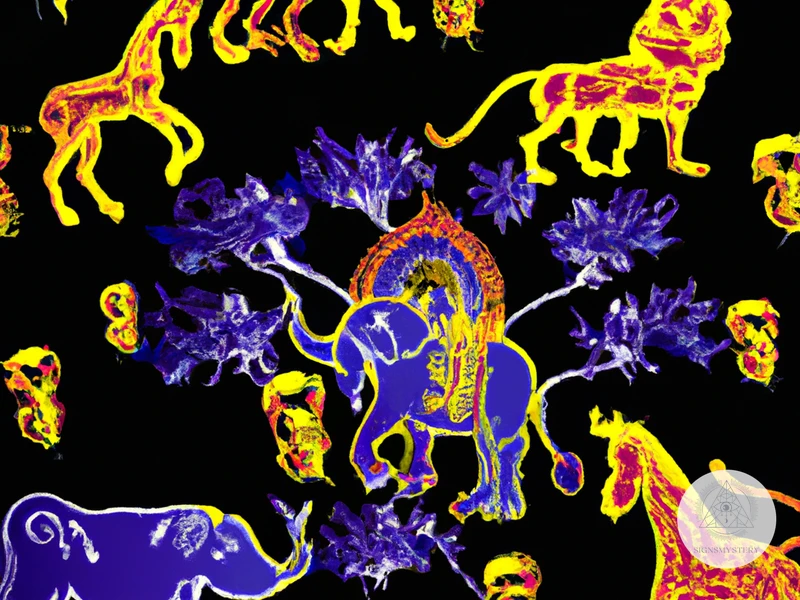
The concept of spirit animals holds a significant place in Hinduism, reflecting the deep connection between the natural world and spirituality. In Hindu belief, spirit animals are seen as divine beings that embody specific characteristics and virtues, serving as guides and sources of wisdom for individuals on their spiritual journeys. These animals are believed to possess unique qualities that align with certain human traits and values, allowing people to draw inspiration and learn valuable lessons from them.
As per Hindu mythology and cultural beliefs, animals are regarded as sacred and are seen as manifestations of deities or divine messengers. Spirit animals can be found in various forms, including mythical creatures, real animals, or a combination of both. They often symbolize different aspects of life, such as strength, wisdom, grace, or protection.
A deep understanding of spirit animals can help individuals gain insight into their own personalities, strengths, and weaknesses, as well as offer guidance in decision-making and personal growth. Whether through rituals, meditation, or simply observing and connecting with the natural world, the concept of spirit animals continues to play a vital role in the spiritual practices and beliefs of many Hindus today.
Spirit Animals in Hindu Mythology
In Hindu mythology, spirit animals hold a significant place as divine beings and symbols of various gods and goddesses. These animal avatars serve as manifestations of the deities, representing different qualities and characteristics. For instance, Lord Vishnu, the preserver of the universe, is often depicted with his vehicle, Garuda, a half-human and half-eagle creature. Garuda symbolizes speed and liberation, carrying Lord Vishnu on his back. Another example is Goddess Durga, who rides a majestic lion, representing power, courage, and valor. These animal mounts, known as Vahanas, have their own symbolism and are revered as sacred beings. Through their presence in Hindu mythology, spirit animals serve to inspire and teach devotees about the qualities they embody. By exploring the myths and legends surrounding these animal avatars, individuals can gain a deeper understanding of the spiritual significance they hold.
1. Gods and Goddesses as Animal Avatars
In Hindu mythology, gods and goddesses are often depicted assuming the form of animals, known as avatars, to interact with the mortal realm. These divine beings take on various animal forms to convey a particular attribute or message to their devotees. One such example is Lord Vishnu, the preserver of the universe, who has taken on numerous avatars throughout history, including the well-known forms of Rama and Krishna.
Goddesses, too, have animal avatars that hold significant symbolism. The goddess Durga, for instance, is depicted riding a lion, symbolizing her ferocity and power. This portrayal encapsulates her ability to vanquish evil and protect her devotees. Another goddess, Saraswati, is often depicted with a swan, representing wisdom, purity, and grace.
These animal avatars serve as powerful symbols and reminders of the divine qualities and lessons that gods and goddesses impart. They inspire reverence, devotion, and a deeper understanding of the multifaceted nature of the deities.
2. Garageya – The Lion Spirit Animal
In Hindu mythology, the lion holds a significant place as a spirit animal, symbolizing bravery, power, and protection. One prominent manifestation of the lion spirit animal is Garageya, a divine figure often depicted as a lion-headed warrior. Garageya is associated with Lord Vishnu, one of the principal deities in Hinduism.
According to ancient texts and scriptures, Garageya is said to have emerged from Lord Vishnu during a battle between the gods and demons. He represents the embodiment of courage and righteousness. As a spirit animal, Garageya encourages individuals to embrace their inner strength and face challenges with courage and determination.
Garageya is also regarded as a guardian and protector. Devotees of Garageya seek his blessings to overcome obstacles and achieve success in their endeavors. His lion form represents fearlessness and the ability to protect oneself and others from negative forces.
Those who connect with Garageya as their spirit animal are often inspired to cultivate bravery, self-confidence, and leadership qualities. They are encouraged to tap into their inner power and face life’s challenges head-on, just as a lion fearlessly confronts its adversaries.
Significance of Spirit Animals in Daily Life
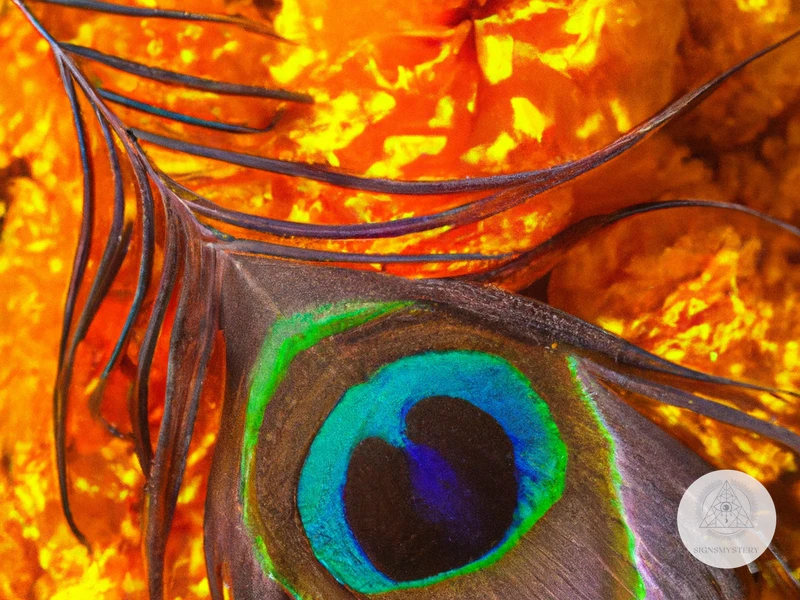
In Hinduism, the significance of spirit animals extends beyond mythology and rituals; it permeates daily life and spiritual practices. Astrology plays a crucial role in understanding the connection between individuals and their spirit animals. It is believed that a person’s birth chart, or kundali, can reveal their spirit animal and its influence on their personality and destiny. Through the study of planetary positions and zodiac signs, astrologers can guide individuals in harnessing the strengths and qualities associated with their spirit animal. Rituals and offerings are made to spirit animals to seek their guidance, protection, and blessings. Whether it is reciting specific mantras, making offerings in temples, or performing ceremonies at sacred sites, these practices provide a sense of connection and reverence towards one’s spirit animal.
Symbolism and Lessons from Spirit Animals
Spirit animals in Hinduism are not only revered for their physical attributes but also for the symbolism and lessons they embody. Each spirit animal represents distinct qualities and virtues that individuals can learn from and strive to cultivate in their own lives. For example, the wise elephant is a symbol of wisdom and intelligence, teaching us the importance of knowledge and learning. The fearless tiger represents strength and courage, inspiring us to face challenges with determination and resilience. The serene swan symbolizes grace and tranquility, reminding us to find inner peace amidst the chaos of life. By understanding the symbolism of these spirit animals and reflecting on their lessons, individuals can gain valuable insights and guidance on their spiritual journey.
1. The Wise Elephant as a Symbol of Wisdom
The elephant holds a special place in Hindu symbolism, revered for its wisdom, intelligence, and strength. In Hindu mythology, the elephant-headed deity, Lord Ganesha, is widely worshiped as the remover of obstacles and the god of intellect and wisdom. Often depicted with a rotund body and a single tusk, Ganesha’s association with elephants signifies not only his unmatched intelligence but also his ability to overcome challenges.
The elephant’s wisdom is also reflected in its behavior. These majestic creatures have intricate social structures, long memories, and a remarkable ability to navigate through difficult terrains. The elephant’s gentle and patient demeanor further reinforces its symbolism of wisdom and tranquility. It teaches us the importance of staying grounded, displaying patience, and using our intelligence to overcome obstacles in our lives.
In Hindu symbolism, the elephant’s association with wisdom extends beyond the realm of deities. It is often depicted in art, sculptures, and architecture, adorning the entrances of temples and homes as a harbinger of good fortune and intelligence.
The symbolism of the wise elephant reminds us to embrace knowledge, cultivate wisdom, and approach life’s challenges with patience and grace. By embodying these qualities, we can navigate the complexities of life with greater understanding and enlightenment.
2. The Fearless Tiger as a Symbol of Strength
In Hindu mythology, the tiger is revered as a symbol of immense strength, power, and fearlessness. It is associated with various deities, most notably the goddess Durga. Durga, often depicted riding a tiger, represents the fierce and protective aspect of femininity. She embodies the ability to conquer evil and restore balance in the world.
As a spirit animal, the tiger serves as a reminder of our own inner strength and courage. It teaches us to be fearless in the face of adversity and to overcome obstacles with determination and resilience. The tiger encourages us to tap into our personal power and embrace our full potential.
In Hinduism, the tiger is also linked to the planet Mars, known as Mangal in Vedic Astrology. Mars represents physical strength, confidence, and assertiveness. The tiger as a spirit animal can, therefore, be seen as an embodiment of these qualities.
When the tiger appears as a symbol or guide, it urges us to embrace our own strength and stand tall in the face of challenges. It reminds us that we have the power to overcome any obstacles that come our way and emerge victorious.
Interpreting Spirit Animal Messages

When it comes to spirit animals, their messages go beyond their physical manifestation. Each spirit animal carries unique symbolism and teachings that can provide guidance and insight into our lives. One way to interpret these messages is through dream interpretation. Dreams have long been considered a powerful tool for communication with the spiritual realm. Paying attention to the presence of specific animals in our dreams can offer valuable clues about our subconscious thoughts, desires, and fears.
Another way to connect with spirit animals is through meditation. By engaging in meditation techniques, we can quiet the mind, open up our intuition, and create a space for spiritual connections. During meditation, individuals may visualize themselves surrounded by their spirit animal or seek guidance and clarification through focused contemplation. This practice allows for a deep connection with the spirit animal and an opportunity to receive wisdom and guidance.
Through the interpretation of spirit animal messages, we can gain a deeper understanding of ourselves, our challenges, and our journey. It is important to approach this process with an open mind and heart, allowing the messages from our spirit animals to resonate within us and guide us towards personal growth and transformation.
Contemporary
Subscribe to Our Newsletter
Sign up to receive the latest news and updates.
Relevance of Spirit Animals
Subscribe to Our Newsletter
Sign up to receive the latest news and updates.
The concept of spirit animals continues to hold immense relevance in modern Hindu practice. Many individuals seek guidance and support from their spirit animal guides as they navigate through life’s challenges and seek personal growth. These spirit animals, believed to possess certain qualities and characteristics, can serve as powerful symbols and sources of inspiration.
1. Spirit Animal Guides in Modern Hindu Practice: In contemporary Hinduism, individuals may connect with their spirit animals through various means, such as meditation, introspection, or seeking the guidance of spiritual teachers. These spirit animals are seen as allies and mentors, offering wisdom and assistance on the spiritual path. By connecting with their spirit animals, people can tap into their own innate strengths and gain clarity in decision-making.
2. Spirit Animals and Personal Transformation: Spirit animals are often associated with specific qualities or traits that individuals may seek to cultivate within themselves. For example, someone with a tiger spirit animal may seek to embody courage and strength, while someone with an owl spirit animal may strive for wisdom and intuition. By embracing the symbolism of their chosen spirit animal, individuals can embark on a journey of self-discovery, personal transformation, and spiritual evolution.
Conclusion
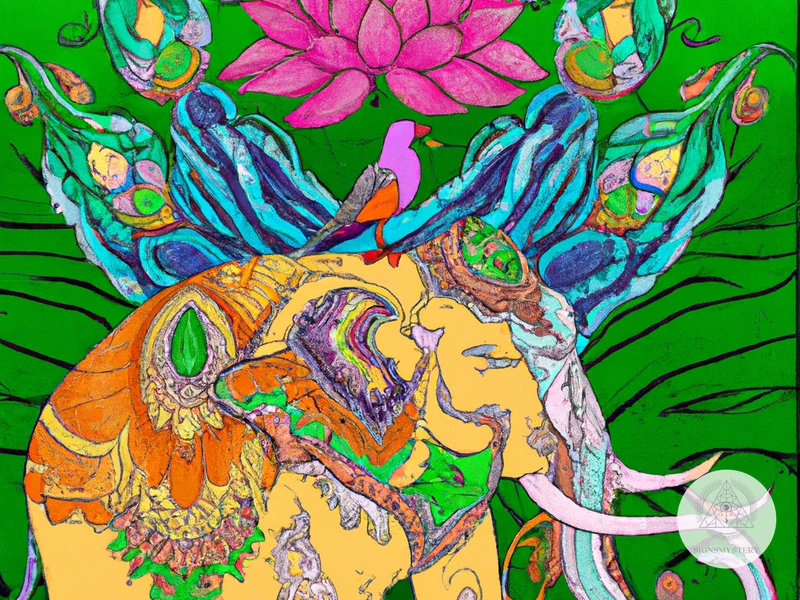
Conclusion

The cultural significance of spirit animals in Hinduism is a testament to the depth and complexity of this ancient religion. From the ancient roots of spirit animals to their portrayal as avatars and mounts of deities, these symbolic creatures hold a special place in Hindu mythology. They continue to have relevance in modern Hindu practice, serving as guides for personal transformation and offering valuable lessons in wisdom, strength, and grace.
Interpreting spirit animal messages is an intriguing aspect of Hindu spirituality, allowing individuals to gain insights and guidance through dreams, meditation, and deep connection. By understanding and embracing the symbolism inherent in spirit animals, individuals can embark on a journey of self-discovery and spiritual growth.
In the hustle and bustle of contemporary life, exploring the spiritual significance of spirit animals can provide a much-needed connection to nature and the divine. Whether through practices like meditation or guidance from spirit animal guides, individuals can tap into the wisdom and power of these sacred beings.
Ultimately, the exploration of spirit animals in Hinduism invites us to embrace our own spiritual journey, acknowledging the interconnectedness of all living beings and the immense potential for personal transformation.
Frequently Asked Questions

FAQs about Hinduism
1. What is the ultimate goal of Hinduism?
At its core, Hinduism seeks to attain moksha, which is liberation from the cycle of birth, death, and rebirth. This liberation allows the soul to merge with the divine.
2. Are there multiple gods in Hinduism?
Yes, Hinduism is often characterized by its polytheistic nature and the worship of numerous gods and goddesses. These deities represent various aspects of the divine and are revered for their specific powers and qualities.
3. Is vegetarianism a requirement in Hinduism?
While many Hindus choose to follow a vegetarian diet, it is not a strict requirement. The decision to follow a vegetarian lifestyle is often influenced by personal beliefs, cultural traditions, and the principle of ahimsa (non-violence).
4. What are the sacred texts of Hinduism?
The Vedas, Upanishads, Bhagavad Gita, Ramayana, and Mahabharata are among the most important and revered texts in Hinduism. These scriptures contain spiritual teachings, stories, and philosophical insights that guide the religious and philosophical practices of Hindus.
5. Do Hindus believe in reincarnation?
Yes, reincarnation is a fundamental belief in Hinduism. It is believed that each soul is reborn multiple times based on the karmic impressions acquired in previous lives, with the opportunity to progress spiritually towards moksha.
6. How do Hindus worship?
Hindu worship can take many forms, including personal prayers and rituals performed at home, as well as elaborate ceremonies conducted in temples. Worship often involves making offerings, reciting prayers, and participating in devotional practices.
7. What role does karma play in Hinduism?
Karma is the law of cause and effect, which governs the consequences of one’s actions. Hindus believe that one’s actions in this life and previous lives determine their present circumstances and future rebirths.
8. Can one convert to Hinduism?
Unlike some other religions, Hinduism does not actively seek converts. It is considered a way of life and is often passed down through generations. However, individuals are welcome to embrace Hindu teachings, practices, and values if they choose to do so.
9. Are there different sects or branches in Hinduism?
Yes, Hinduism is a highly diverse religion with various sects and branches. Some of the major ones include Vaishnavism, Shaivism, Shaktism, and Smartism. Each sect has its own practices, deities, and philosophies.
10. What is the significance of holy rivers in Hinduism?
Holy rivers, such as the Ganges, Yamuna, and Saraswati, hold great spiritual significance in Hinduism. They are believed to be purifying and offer a pathway for spiritual liberation. Pilgrimages to these rivers are considered sacred and an act of devotion.
References
- The Elephant Men | Living Gods | Nature
- The Sacred Animals of Hinduism
- 10 Spirit Animals With Deep Meanings
Frequently Asked Questions

1. Why are spirit animals significant in Hinduism?
Spirit animals are considered significant in Hinduism because they represent the connection between the physical and spiritual realms, guiding individuals on their spiritual journeys and providing valuable lessons and insights.
2. Are spirit animals worshipped in Hinduism?
Spirit animals themselves are not typically worshipped in Hinduism. However, they are revered and respected as divine messengers, symbols, and sources of guidance.
3. How do spirit animals relate to Hindu mythology?
Spirit animals have a strong presence in Hindu mythology as gods and goddesses are often depicted in the form of animal avatars, and various deities have animal mounts known as “vahanas”.
4. Can different people have the same spirit animal?
Yes, it is possible for different individuals to have the same spirit animal. Spirit animals can be universal symbols that hold specific meanings and lessons for everyone, regardless of their individual experiences.
5. Is astrology connected to spirit animals in Hinduism?
Astrology plays a role in connecting individuals with their spirit animals in Hinduism. The zodiac sign or Nakshatra (lunar mansion) associated with an individual’s birth chart can provide insights into their spirit animal.
6. How can I connect with my spirit animal?
You can connect with your spirit animal through practices such as meditation, visualization, and dream interpretation. Recognizing and acknowledging the signs and symbols that appear in your life can also help you establish a connection.
7. Do spirit animals provide specific messages?
Yes, spirit animals often communicate specific messages through their presence and behaviors. These messages can be interpreted and applied to various aspects of one’s life, including personal growth, relationships, and decision-making.
8. Can spirit animals change over time?
Yes, it is possible for spirit animals to change over time. As individuals evolve and go through different phases of life, their spirit animal may change to reflect their new lessons and challenges.
9. Do spirit animals have a symbolic meaning?
Yes, each spirit animal holds a symbolic meaning in Hinduism. For example, the elephant is often seen as a symbol of wisdom, while the tiger represents strength and the swan symbolizes grace.
10. Are spirit animals only relevant in ancient Hindu practices?
No, spirit animals continue to be relevant in modern Hindu practices. They are seen as guides and sources of inspiration for personal transformation and spiritual growth, even in contemporary times.

